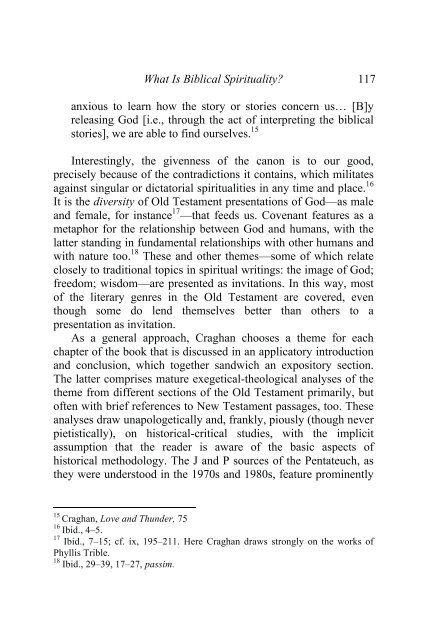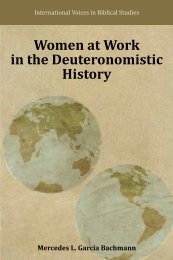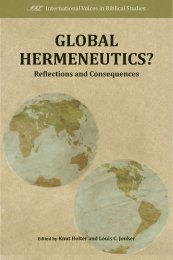The Old Testament and Christian Spirituality - International Voices in ...
The Old Testament and Christian Spirituality - International Voices in ...
The Old Testament and Christian Spirituality - International Voices in ...
Create successful ePaper yourself
Turn your PDF publications into a flip-book with our unique Google optimized e-Paper software.
What Is Biblical <strong>Spirituality</strong>? 117<br />
anxious to learn how the story or stories concern us… [B]y<br />
releas<strong>in</strong>g God [i.e., through the act of <strong>in</strong>terpret<strong>in</strong>g the biblical<br />
stories], we are able to f<strong>in</strong>d ourselves. 15<br />
Interest<strong>in</strong>gly, the givenness of the canon is to our good,<br />
precisely because of the contradictions it conta<strong>in</strong>s, which militates<br />
aga<strong>in</strong>st s<strong>in</strong>gular or dictatorial spiritualities <strong>in</strong> any time <strong>and</strong> place. 16<br />
It is the diversity of <strong>Old</strong> <strong>Testament</strong> presentations of God—as male<br />
<strong>and</strong> female, for <strong>in</strong>stance 17 —that feeds us. Covenant features as a<br />
metaphor for the relationship between God <strong>and</strong> humans, with the<br />
latter st<strong>and</strong><strong>in</strong>g <strong>in</strong> fundamental relationships with other humans <strong>and</strong><br />
with nature too. 18 <strong>The</strong>se <strong>and</strong> other themes—some of which relate<br />
closely to traditional topics <strong>in</strong> spiritual writ<strong>in</strong>gs: the image of God;<br />
freedom; wisdom—are presented as <strong>in</strong>vitations. In this way, most<br />
of the literary genres <strong>in</strong> the <strong>Old</strong> <strong>Testament</strong> are covered, even<br />
though some do lend themselves better than others to a<br />
presentation as <strong>in</strong>vitation.<br />
As a general approach, Craghan chooses a theme for each<br />
chapter of the book that is discussed <strong>in</strong> an applicatory <strong>in</strong>troduction<br />
<strong>and</strong> conclusion, which together s<strong>and</strong>wich an expository section.<br />
<strong>The</strong> latter comprises mature exegetical-theological analyses of the<br />
theme from different sections of the <strong>Old</strong> <strong>Testament</strong> primarily, but<br />
often with brief references to New <strong>Testament</strong> passages, too. <strong>The</strong>se<br />
analyses draw unapologetically <strong>and</strong>, frankly, piously (though never<br />
pietistically), on historical-critical studies, with the implicit<br />
assumption that the reader is aware of the basic aspects of<br />
historical methodology. <strong>The</strong> J <strong>and</strong> P sources of the Pentateuch, as<br />
they were understood <strong>in</strong> the 1970s <strong>and</strong> 1980s, feature prom<strong>in</strong>ently<br />
15<br />
Craghan, Love <strong>and</strong> Thunder, 75<br />
16<br />
Ibid., 4–5.<br />
17<br />
Ibid., 7–15; cf. ix, 195–211. Here Craghan draws strongly on the works of<br />
Phyllis Trible.<br />
18<br />
Ibid., 29–39, 17–27, passim.




